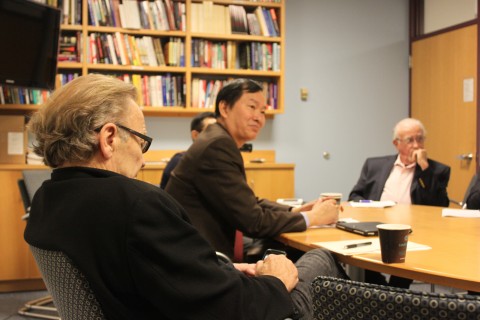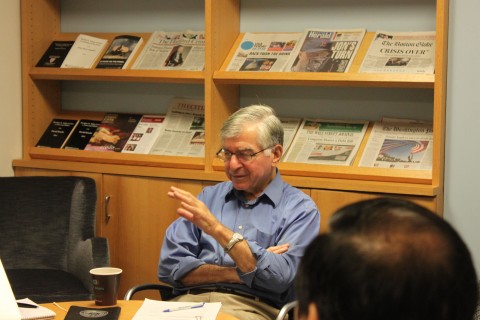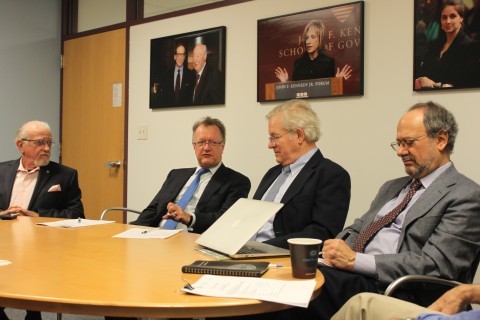
by Admin | Oct 29, 2013 | Highlights
“Which is greater: the cost of corruption, or the cost of compassion?”
That was the question posed during a recent meeting of Boston Global Forum. Led by BGF Co-Founder and Chairman Michael S. Dukakis, attendees gathered to discuss the plight of the working poor worldwide, and determine paths of action to address the pandemic problem of worker safety.

Mr. Tuan Nguyen, Editor-in-Chief of Boston Global Forum.
Global outcry reached a peak on April 24, 2013, when more than 1,000 garment workers in the Rana Plaza of Bangladesh – most of them women – were killed in a factory collapse. The building was just one of the country’s 5,000 factories, few of which are regulated, and the tragedy shone a spotlight on the need for workplace requirements as well as human dignity.
Bangladesh is pivotal to the international garment industry. While it is second only to China in the revenues generated from garment production, Bangladesh’s factory workers have little hope for economic growth, receiving just one-fifth of the wages Chinese garment workers receive. Despite this economic disparity, garment exports from Bangladesh are expected to triple between 2005 and 2010, and triple again by 2020.
Declaring minimal standards for worker safety as the 2013 Issue of the Year, the Boston Global Forum will host a conference on minimal global standards for worker safety on Nov. 18th from 7:30-9 a.m. The web-based seminar will air early to allow individuals from Asia to participate. The conference will bring together leaders in public policy, business, organized labor, civil society and the media, as well as providing participants the opportunity to provide their own viewpoints.

Chairman Dukakis posed a thought-provoking point during the meeting.
Dukakis stressed the importance of not only providing a forum for people to discuss issues of worker rights, but also bringing together leaders from multiple fields connected to international production and business. “We have an enormous opportunity here,” Dukakis said. “If we can bring in good people and develop a growing group who have significant experience dealing with this, we can really make some sense (of this issue).”
Tuan Nguyen, Co-Founder and Editor-in-Chief of the Boston Global Forum, focused on diversifying the conference’s audience between the U.S. and Asia. “It’s very important, and the online conference will help many people contribute, moderate, and even interact across online and social media,” he said.

Professor John Quelch of the Harvard Business School addresses the meeting.
Robert Kuttner, Co-Founder and Co-Editor in Chief of The American Prospect magazine, said, “what drives (this situation) is these desperately poor countries eager to attract lots of jobs in apparel. There are hundreds of millions of people who desperately need these jobs. Even though these jobs are dismal by American standards, defenders of the low standards will say, well, they’re better than what was there before. It incubates an industry that you hope will be the first rung on the ladder of better industries.” Therefore, Kuttner said, it might behoove the conference to address not only workers’ safety, but also worker and labor rights.
Dukakis agreed, adding that the American public would be shocked to learn just how much of a difference a few pennies could make in the lives of workers. In most cases, he said, “we’re talking about a nickel (per purchase). I think the American people would respond to that.”
John Quelch, Professor of Harvard Business School, pointed out that another crucial factor of international relations was corruption.“There can be very sharply enforced rules, and still money is going under the table into somebody’s pocket,” he said. “But I’m really convinced, when looking at the economics of this issue, is that the cost of compassion is less than the cost of corruption, in terms of the retail price effect.” Still, Professor Quelch said, “the volume of production in Bangladesh is so enormous that it’s a (crucial) part of the world’s supply.”
Ultimately, meeting attendees decided to reach out to leaders across multiple fields, including public policy, journalism, civil society, business, and organized labor. The Online Conference on Minimal Global Standards for Worker Safety will be broadcast on Boston Global Forum at 7:30 a.m. Nov. 18th Boston time.

by Admin | Sep 27, 2013 | Highlights
[For Part 1 of our discussion, please click here]
Dr. Jones specializes in trade policy and institutional issues, particularly those focusing on the World Trade Organization. He has served as a consultant to the National Science Foundation and the International Labor Office and as a research associate at the U.S. International Trade Commission, and was senior economist for trade policy at the U.S. Department of State. Dr. Jones is the author of numerous articles and four books, including Politics vs. Economics in World Steel Trade, Export Restraint and the New Protectionism, Who’s Afraid of the WTO? and most recently, The Doha Blues: Institutional Crisis and Reform in the WTO.

In light of some recent developments Boston Global Forum (BGF) has made, we had an opportunity to sit down with Professor Kent Jones of Babson College again to explore other possible solutions for our topic. Readers of our previous posts may have noticed that BGF was able to identify Better Factories Cambodia as a possible model for other countries to replicate. However, according to Professor Jones, there is a reason why this strategy may not be possible.
BGF: Many experts attributed the success of Better Factories and the International Labor Organization’s involvement in Cambodia to a trade agreement between the U.S and Cambodia in 1999, which basically required improved labor conditions for factory workers in exchange for a higher percentage of quota for garment exports into the U.S. If this is the case, why do you think that the U.S government, or any other Western powers, did not re-implement a similar agreement in order to incentivize local authorities to come up with better working conditions for garment workers in their countries?
Professor Kent Jones: There was indeed a formal special textiles/clothing trade agreement between Cambodia and the US in 1999, which led to improvements in working conditions there. Unfortunately, the circumstances that allowed this agreement have changed, and it is no longer possible to replicate it for other countries.
At the time, Cambodia, like all other developing countries, was subject to the Multifiber Agreement (MFA), a global system of trade quotas on nearly all categories of clothing sold in the US, Europe and other industrialized countries. Each exporting country typically had certain quota shares in the US market, which were strictly controlled.
The US-Cambodia agreement was designed to provide an incentive for Cambodia to improve worker rights and working conditions in exchange for significant increases in its quota access to the US market. As part of the arrangement US AFL-CIO representatives went to Cambodia to organize workers there and monitor progress. There were controversies during those years as to how much progress was being made, but in the end Cambodia did receive increased market access as a result of the reforms that took place.
There were two important elements of the deal that were crucial in making it work. One was that the MFA ruled the world textile/clothing market. This global system of quotas allowed countries like the US to offer special deals to certain countries based on criteria such as progress on worker rights (other deals were based on political criteria). The second element was that Cambodia was not in the WTO; it joined eventually in 2004.
These circumstances were important because the MFA was being phased out at the time for members of the WTO, based on the new agreements of the Uruguay Round of trade negotiations, completed in 1994. As long as the MFA was in force, Cambodia could benefit from its special agreement on market access with the US, since all other countries were restricted by MFA quotas. As the MFA was phased out over the period 1995-2005, all WTO countries were gradually allowed more and more unfettered access to the US and European markets, which was eroding the benefits of any extra quota access granted to Cambodia.
Still, the US-Cambodia deal allowed the US to continue the incentive program until Cambodia joined the WTO (after a long accession process) in 2004. At that point, Cambodia was entitled to the full benefits of the MFA phase-out that was completed in 2005. The US no longer had any leverage to control Cambodian market access to the US, based on the MFN treatment Cambodia received upon joining the WTO, and the MFA phase-out that now applied to Cambodia as well.
We now have a quota-free global trading environment in textiles and clothing. Tariffs are still imposed on these products, but they are regulated by the WTO tariff binding rule, which prohibits countries from raising tariffs unilaterally. In addition, the MFN rule prohibits WTO members from raising tariffs against any other individual WTO member on a discriminatory basis. Thus a deal like the earlier US-Cambodia agreement would no longer be possible for any WTO members, including Bangladesh.
The legacy of the agreement was that it gave the ILO, workers’ rights and labor unions a foothold in Cambodia, and these groups continue to have some impact there. Improvements in working conditions and worker rights in Bangladesh and other countries will have to come from other strategies besides intergovernmental trade deals.
This is why, as I suggested in our discussion a few weeks ago, that company codes of conduct, backed up with consumer group or NGO pressure, would be the most promising path.
Otherwise, a formal plan for improving a country’s work environment would require the government itself to agree to ILO and/or outside group monitoring of labor conditions. The US and other countries may need to find other means of leverage in order to persuade reluctant governments to implement reforms.
BGF: Thank you for your insights, Professor.

by Admin | Sep 13, 2013 | Highlights
[For Part 2, please click here]
Boston Global Forum (BGF) had an opportunity to sit down with Professor Kent Jones of Babson College. Dr. Jones specializes in trade policy and institutional issues, particularly those focusing on the World Trade Organization. He has served as a consultant to the National Science Foundation and the International Labor Office and as a research associate at the U.S. International Trade Commission, and was senior economist for trade policy at the U.S. Department of State. Dr. Jones is the author of numerous articles and four books, including Politics vs. Economics in World Steel Trade, Export Restraint and the New Protectionism, Who’s Afraid of the WTO? and most recently, The Doha Blues: Institutional Crisis and Reform in the WTO.

BGF: As an authority on international trade, what do you think will be a possible solution to prevent another Bangladeshi tragedy from happening?
Professor Kent Jones: As any economists would point out, the problem is clear—the building’s standard was extremely poor and, thus, a possible solution must involve the improvement of building standards in factories around the world. However, this is a very complicated task to achieve, and any meaningful procedure must include leadership from multiples fronts—the multinationals, the government, humanitarian groups, NGOs, groups like Boston Global Forum and international organizations such as the ILO [International Labor Organization]. The ILO does have an international labor standard and the ability to send in teams to investigate the safety of factories. However, the problem arises when the ILO does not have enforcement authority, meaning that, even though it can raise concerns over any violations of working standards, the ILO does not have any rights to punish or sanction the respective country. The case for the WTO, however, can be more interesting. As for the idea of having the WTO address this problem, this seems to be attractive to many people, since the WTO does have the authoritative power of pressuring member countries [Bangladesh has been a member since 1995]. The procedure is as follows: if a member nation violates a WTO trade agreement, that country would have to send a representative to present in front of the WTO Dispute Settlement court in Geneva. If the country is found guilty of violating any trade codes, the WTO would allow a certain period of time for the country authority to change its policy. Eventually, if nothing happens, the WTO may then allow the country’s trading partners to raise tariff and/or other fines. Thus, it is an attractive idea that the WTO should play a role in preventing a Bangladeshi tragedy to happen again. Unfortunately, this idea will not work. First, the WTO has a very small budget [195 million Swiss Franc in 2013]. More importantly, the WTO does not protect international labor standard at the moment, and I am skeptical that any discussions to include this issue into the current code would be effective, because every time the WTO adds a certain policy, it has to receive approval from all of its 159 members.
In any cases, our best hope is to have the multinationals at the forefront of this issue, for a number of reasons, but the most important is that these brands all have images they need to keep in the eyes of the consumers. If, for example, Walmart, Macy’s and JCPenney sit down together and develop a “code standard” that requires their subcontractors to maintain the international labor standard, there is possible progress we can rely on.
BGF: You already discussed about the WTO’s role in solving this issue, how about the World Bank and the IMF?
Professor Kent Jones: These two organizations indeed have much larger budgets than the WTO and do have powers to achieve what we hope. The IMF, however, does involve in larger scale projects, for example, improving a country’s financial services sector. The WB, on the other hand, has a lot of potential to be an impactful force on the quest to improve labor standards in the countries which it provides financing.
BGF: Thank you for your time, Professor.

by Admin | Sep 11, 2013 | Highlights
Boston Global Forum (BGF) had an opportunity to speak with Arnold Zack, an Arbitrator and Mediator of over 5,000 Labor Management Disputes since 1957; former President of the Asian Development Bank Administrative Tribunal; designer of employment dispute resolution systems;; occasional consultant for the governments of the United States (Department of State, Peace Corps, Department of Labor, Department of Commerce), Australia, Cambodia, Greece, Israel, Italy, Philippines, and South Africa, as well as the International Labor Organization, International Monetary Fund, Inter-American Development Bank, and UN Development Program. He has also been a Member of Four Presidential Emergency Boards (chair of two). (Harvard Law School), and currently teaches at the Labor and Worklife Program at Harvard Law School.

BGF: Can you tell me about your background and the works you have been involved with?
Arnold Zack: I am a lawyer, a mediator and arbitrator and I have helped design dispute resolution machinery in countries including South Africa, Bermuda, Ukraine, and many other countries. In 2005, I became interested in what is happening in China. Currently, I am involved with MIT developing a project in China to train the next cadre of graduates at affiliated business schools to have a sensitivity of work place problems. I am also mostly interested in educating these graduates to be able to design machinery that can help avoid problems like the suicides at Foxconn, and which leads to tens of thousands of strikes in China each year.
Right now, I divide my time between arbitrating for corporations like AT&T and American Airlines and the project in China. I am primarily interested in helping workers live in better conditions, make more money, and lead better lives. Obviously, there has to be a balance between these issues and the legitimate claims of employers making money and having responsibilities to stockholders. Of course, the question is what a fair balance should be. However, I am less interested in figuring out where this balances lies than in developing machinery and procedure so people can negotiate and talk about those problems. Especially, I would like to enable workers the ability to feel empowered enough to peacefully resolve disputes, so that they do not have to go on strikes, get beaten, thrown into jails and lose their jobs. You have to note that there is no prescribed level as which there is an economic balance between workers and management. In fact, there are international standards and norms, but, so far, there is no legislation that mandates worldwide employers to abide by these standards.
In any cases, I hope that I can create enough public pressure and stress the self-interests of related parties to realize the benefits of developing procedures to negotiate their differences. I think the only pragmatic approach to achieve my goal is by focusing on the self-interests and to try to establish fair procedures. We have accomplished this in the US in the union management field through the National Labor Relations Act of 1935. I have been able to accomplish this task within the U.S for individual employment disputes, outside of collective bargaining. The Arbitration Act of 1925 has been used by employers to require a commitment, by new employees that, as an employment condition, they go to arbitration mandated by the employer over any employment disputes and give up their rights to appeal to court for enforcement of statutory rights. The Supreme Court case of Gilmer vs. Interstate/Johnson Lane in 1991 endorsed such mandatory arbitration. In this case, an employee, who was hired as a stockbroker, got fired at the age of 42 or so. He tried to sue the employer based on the Age Discrimination Act, but failed, as, upon signing the employment agreement, he had given up up his rights to go to court and was forced to go through an arbitration process. I believed this process was not entirely fair and we had to have a fair procedure, so I brought to the table all related parties—the management, the union, worker groups, the American Civil Liberties Union the American Bar Association, and American Arbitration Association and established a standard procedure of fairness, called “Due Process Protocol.”
I have been trying to replicate this internationally, and I had some success in developing a similar procedure in South Africa after black workers refused to join unions controlled by white workers when allowed to in 1982. The black workers organized and white employers realized it was to their benefit to negotiate with them to resolve their disputes. We developed procedures to train mutually acceptable mediators and arbitrators and make them available to disputants to minimize strikes and establish workplace procedures for negotiation. This became the model for the development of the new constitution where the partnership of worker unions, employers and the academics established a partnership to assure resolution of political conflict. That procedure has worked well until recently when it seems to have fallen apart.
BGF: You mentioned the self-interest of related parties, can you elaborate on this point—how does this relate to your efforts and how can this help address issues including the tragedy in Bangladesh?
Arnold Zack: We accept in the US that there will be a level playing fleld in which management and the designated representative of its workers will be able to meet an negotiate the resolution of their disputes over wages hours and working conditions. That is also what happened with the development of the labor law in South Africa. But the problem as it arises in an individual country is different when one focuses on the global economy, where brands and employers seek locations where they can best enhance their profit as they make their products for the global market place. With a competitive market on price, they can best maximize their profit by paying the lowest wages to workers and having them work the longest hours, particularly if the host government turns its head, accepts bribes to avoid enforcement of their national labor laws and keeps workers from organizing into a single voice to express their demands.
The concept of employees having freedom of association and the right to engage in collective bargaining is one which is enshrined not only in the UN Human Rights Charter, it is also an international norm established by the Conventions of the ILO. In our global economy, the quest of employers seeking to produce their products at the lowest possible cost to enhance their profits, has too often led them to South East Asia where workers receive the lowest wages, and have the least protection from their own national governments. What transpired in Bangladesh with its garment factory fires is just the most recent example of the extent of such exploitation despite the availability of international norms trying to establish workplace fairness. As noted earlier the ILO establishes norms, but most nations do not enforce them within their own laws and too many countries are so corrupt that they disregard the safety as well as the workplace rights of their citizens to pocket a little more money from the contracting factory owners. The world has tended to rely on the brands to monitor these factories, although the evidence increasingly shows they cant or wont do that, turning a blind eye to the corruption and worker exploitation. There is one example to the contrary, however, Cambodia, where the ILO Itself does the monitoring, and where a separate organization the Arbitration Council provides mutually acceptable arbitrators to resolve disputes over whether there has been conformity to contract and law seeking to achieve compliance with ILO conventions. . The experience there since 2002 has lead to an expansion of the garment factories, a spread of the system to construction and tourist industries, an increase in the number of unionized employees as part of an expanding work force, and all with a notable decrease in strikes and work stoppages.. Unfortunately the Cambodian experiment has not been widely replicated because of the cost involved, but it is a beacon of what can be done with international will, national cooperation and open mindedness by the employers recognizing that they do better, and make more money when their operations are conducted smoothly without strike interruption and with machinery in place to forestall workplace disruption
Going back to our China story, the self-interest of the workers is to have fair working conditions. In the Foxconn case, a worker committed suicide because she was begging for a couple of days off to go see her brother but such leave was not approved. That case was just one of a dozen suicides. Thus, you see how the workers’ self-interest is simply being able to express themselves through a process of negotiation with the management. The United Nations Human Rights Convention gives workers the right to freely associate and to bargain collectively with management on their working conditions, wages, etc., so the workers should really have the right to get to a negotiation table and talk to their employers.IT is only logical that they strike when they are denied that basic human right. On the other hand, the self-interest of brands like Apple, Nike and Honda is to produce their products on time and sell them overseas without interruption in the workplace. Let’s take Apple, for example. Apple does not want their stockholders to say that they mistreat workers and then to decide not to invest in the company. Apple has an impact on Foxconn, but it’s also in the self-interest of the contractors like Foxconn to balance their desire for maximized profits against maintaining Apples confidence and contracts. Since , if Apple pulls out of China, Foxconn would go bankrupt. Besides, it’s also in the self-interest of the Chinese governments that these brands stay in the country to provide work and income for the Chinese citizens.
Thus, what I do now is basically to go around the world and tell these parties that it is in their self-interests to provide fair working conditions. When I was in Shanghai to speak with the American Chamber of Commerce there, plant managers asked how we could stop these strikes, and I told them that you could control these strikes by listening to and negotiating with the leaders speaking on behalf of the workers. They responded saying that the law did not require them to do so. In fact, even though China is a collective society, there is no room for workers to select their own unions or union leaders, The officially recognized unions are those organized by the ACTFU (All-China Federation of Trade Unions). Thus, the problem arises when workers believe the ACTFU does not represent them. Despite having legal and contractual rights as individuals, workers, when they unite and start demanding improved conditions, higher wages and the like, do not have any established vehicles or laws that require employers to sit down and talk to them, even though the ILO (International Labor Organization) Conventions of 87 and 98 state that workers have to rights to organize into unions and the right to bargain collectively with their employers.
Let’s look at an example of what has been happening in China to gauge the power of these spontaneous strikes of workers organizing collectively. In 2010, when Honda workers went on strike and demanded a 30% increase in their payroll, the managers compromised and gave them 20%. After that, they went back on strike again and got the remaining 10% they demanded. In most parts of the world, workers have peaceful rights to organize themselves and employers have the obligations to start negotiating. Only when this procedure fails do the employees then go on strike to exercise power to get the employer to change its position. In China and Vietnam however, it actually works backwards, the workers have to go on strike first to demand the employers to come to the table so they can talk to employers. This is the reason why I am collaborating with the business schools in China to install into the existing curricula crucial topics including negotiation, ethical standard of labor conditions and fair procedures. In addition, we’re also successful in getting a local university to establish an independent center to educate workers on topics such as peaceful resolution and the economics of running a business, as an average worker may not understand the economics of overhead, profit margin, wages, and etc.
Besides, it is also understandable why China would be skeptical of some procedures which would give workers the right to elect their own leaders, as the fall of the Soviet Union is often traced to the Solidarity Movement in Gdansk Poland where Lech Walensa led the establishment of a real trade union insisting on the right of workers to negotiate with their employer in that case the government owned ship yards. At the moment, the Chinese government does not allow workers to form their own unions. However, I believe the risk of losing foreign direct investments would outweigh the risk of opening the door for more democratic procedures at the workplace. Also, the government, so far, has not done anything to restrict us from entering the country. I am also trying to convince them that this is a practical method to resolve the problems of wildcat strikes, managers being taken hostage and other examples of frustrated workers seeking to gain a seat at the table to discuss their working conditions with management. I believe it is also in the self interest of the ACFTU to shift its role from one of monitoring the workplace to a role of representing the workers in peaceful negotiations with their employers.
This is not complex science; it is merely recognition that all the players in the economy have priorities of self interest and achieving “more” as they define that term even if at the expense of other players in their arena. But when the power is so lopsided that some of the players are excluded, or worse exploited, society owes it to all those involved to assure some measure of equity and fairness. In the world of factory work the world standard has been to permit employees if they so choose to band together as an entity that is more compatible to the power of the employer, and that standard as proclaimed by THE UN Charter and ILO conventions has been to encourage peaceful negotiations between the two parties as a better alternative to exploitation and workplace disruption through strikes. All I have been trying to do in the US and abroad is to encourage the parties to recognize that their self interest is best satisfied by recognizing that the other side likewise has self interests and that negotiations is the most rational means of resolving their conflicts. To the extent that I get people to listen to me, that is a satisfying reward. To the extent that they ask me to help them develop procedures to cope with these problems it is a reward not only for me but for the parties and society as a whole.









